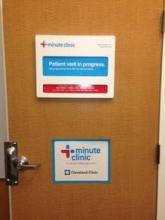Two of the nation’s biggest retail pharmacy chains have begun to embrace physicians as partners with their in-store clinics and, in the process, position themselves as integral parts of accountable care organizations and patient-centered medical homes.
And, some of America’s biggest and best-known health systems are returning the embrace, although somewhat tentatively.
In Ohio, the Cleveland Clinic and MinuteClinic have teamed up. The affiliation with MinuteClinic, a division of CVS Caremark, began in 2010, mainly as the Cleveland Clinic explored whether to provide drop-in care, according to Dr. Michael Rabovsky, vice chair of the Cleveland Clinic’s Medicine Institute. Now, 21 MinuteClinics carry the Cleveland Clinic brand; that number soon will expand to 24, he said.
Cleveland Clinic physicians – paid a small stipend – are available 24 hours a day, 7 days a week to consult with the MinuteClinic nurse practitioners and physician assistants; they also conduct chart reviews and educational sessions with MinuteClinic staff.
The retail clinics are "helping to provide access to our patients in the right type of medical setting, where they’re going to get the best value for the cost," Dr. Rabovsky said, adding that the relationship offers patients an alternative to the emergency room, and a place get care on nights and weekends.
Having the retail clinics as an access point for urgent and primary care services also could free up physicians’ time to manage chronic diseases, Dr. Rabovsky said. "We have to figure out models to accommodate that demand."
An IT integration has strengthened the relationship. Now, when a Cleveland Clinic patient goes to a MinuteClinic, the notes from that encounter are sent electronically to his or her physician.
Dr. Andrew Sussman, MinuteClinic president, said that typically notes are faxed to the primary care physician for all encounters. When the electronic health records are integrated, notes are sent electronically and MinuteClinic providers have better access to information such as medication lists and allergies.
In collaboration with other health systems, MinuteClinic is expanding the services it provides – offering hypertension and diabetes management, for example. In those instances, the programs and protocols are developed with the collaborating health system, Dr. Sussman said.
"We don’t take over the care of their chronic disease," he said, noting that patients are always sent back to their physicians for medication adjustment or for anything that requires more than counseling or measurement. "We don’t see ourselves becoming their primary care physician or their exclusive medical home."
Dr. Rabovsky said that MinuteClinic has approached the Cleveland Clinic to offer more in-depth services, but "we haven’t decided yet how we want to partner with delivering that aspect of chronic care," he said.
In Baltimore, Johns Hopkins Medicine* is proceeding slowly on its collaboration with Walgreens. That affiliation began in 2011, with Hopkins agreeing to help develop guidelines and disease management protocols for the pharmacy chain’s Healthcare Clinics (formerly known as Take Care).
In June, the two announced their collaboration on a new model pharmacy to be built on Hopkins’ East Baltimore campus.
The store – slated to open in November – will house a Healthcare Clinic. Besides offering acute care and immunizations, the clinic will offer student health services, education, treatment and management of chronic disease, smoking cessation, and HIV testing.
For Hopkins, the idea is to have a community resource that can be closely linked back to the health system and fill in some of the gaps, said Dr. Jeanne Clark, interim director of the university’s division of general internal medicine. "I don’t think we’re providing adequate care and adequate access for all the patients," she said, suggesting collaboration with retail clinics could ensure adequate care and improve access to care for patients.*
The collaboration can offer patients better access to acute care, or it can serve as an initial transition into primary care, she said. It’s also possible that Hopkins will get referrals from the clinic.
"Together with Hopkins physicians, we’re going to be working hand-in-hand," said Dr. Jay Rosan, Walgreens’ senior vice president of health innovation.
Dr. Rosan noted that a third or more of patients who use Walgreens clinics do not have a primary care physician. Studies and surveys have shown that retail clinic users are less likely to have insurance or a usual source of care and that they are generally under age 30.
In January, Walgreens announced that it formed accountable care organizations with three physician-led groups: Advocare in Marlton, N.J.; The Diagnostic Clinic in Largo, Fla.; and Scott & White Healthcare in Temple, Tex. Walgreens pharmacists and Healthcare Clinic providers will work closely with primary care physicians to improve access and quality of care while reducing overall health care costs. The three ACOs have been approved by the Centers for Medicare and Medicaid Services.


